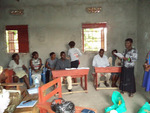Women Call Centre Uganda
Unverified non-profit organisation
Women Call centre Uganda is community based in Kasese Uganda requesting for empowering young women and Girls with Duck rearing.
Duck Poultry is an integral component of the farming system in Uganda lake regions and provide significant nutritions to people living with HIV/AIDS And COVID-19. Before the nineties of the last century, backyard poultry farming system was the main source of poultry meat and eggs in Uganda, but since the mid nineties with the development of commercial broiler and layer farming in the country, a major portion of poultry meats and eggs are being supplied by these commercial farms. The current production of animal proteins is not enough to meet the national demand and there is good evidence for a huge deficit of animal proteins in Uganda During Covid 19. The average annual per capita availability of meat in Uganda is only 9.12 kg against the required amount of 43.25 kg; the share of poultry meat is only 1.9 kg. The annual per capita availability of eggs is about 36 against the required amount of 104
Duck healthcare issues
Farmers’ lack of knowledge of diseases of ducks leads to high mortality rates and thus lowering household income. Mortality rates of ducks due to disease outbreak (primarily due to duck plague and duck cholera) are around 30 percent at the Haor region (according to author’s observation). Farmers that are lacking sufficient knowledge of disease management; prevention and control are always threatened by the risk of disease outbreak. In the Haor region there is also lack of duck healthcare services from certified, skilled and experienced veterinarians. Moreover, limited opportunities for communication between the flocks located deep inside the Haor region and veterinary offices are also constraints for providing service by the Government or NGOs. There are no large investors or private companies that are service providers for the duck farmers in Uganda. So the Government is still the only supplier of important duck vaccines all over the country. During earlier works in the Haor region BRAC found shortage of vaccine supply from government sources and there were also gaps in the vaccine supply chain. Middlemen were dominating the vaccine supply chain and due to lack of knowledge many farmers were administering vaccines at a higher dose than required. They thus wasted vaccines while at the same tim
Lack of knowledge of duck farming and poor systems
Duck farmers take it for granted that their ducks will be fed by nature with whatever quantity of eggs they will get. They have no knowledge of the requirement of balanced diet for ducks, the amount of protein, mineral, salt, fiber, etc., which would increase the productivity of their flock. Strategies for development of the value chain have been set in such a way that the duck farmers in the selected areas will increase their production by 40 percent, increase sales by at least 40 percent, increase income by 30 percent and increase employment by 20 percent by the year 2012.
Lack of engangement of women in duck rearing on lake shores
The women have no access to duck rearing and husbands have brutally hand women in families and women need to own small farm projects that relieve them from exploitations and begin earning incomes.
Gender issues
Women and girls shall have the biggest role in taking care of the ducks in the backyard duck farming system, sometimes with the involvement of girl children. The involvement of men is limited by selling eggs to the local markets. In case of commercial duck farming men are more involved as the nature of farming requires the farmers to stay and move outside their house. However, a baseline survey conducted by BRAC showed that farms having up to 100 ducks are basically owned by women and about 30 percent of the farms having more than 100 ducks are also owned by women, even though women have limitation to go the Haors with their flocks by themse






